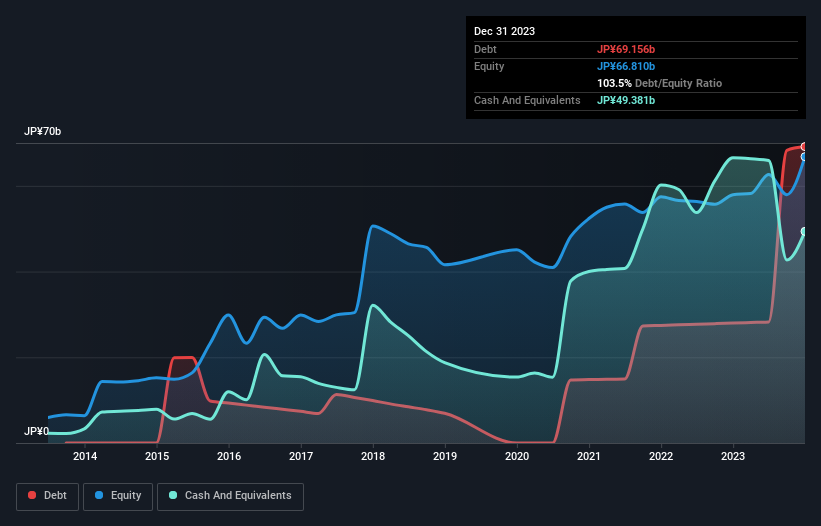
David Iben put it well when he said, 'Volatility is not a risk we care about. What we care about is avoiding the permanent loss of capital.' When we think about how risky a company is, we always like to look at its use of debt, since debt overload can lead to ruin. We note that Nxera Pharma Co., Ltd. (TSE:4565) does have debt on its balance sheet. But the real question is whether this debt is making the company risky.
Why Does Debt Bring Risk?
Debt and other liabilities become risky for a business when it cannot easily fulfill those obligations, either with free cash flow or by raising capital at an attractive price. In the worst case scenario, a company can go bankrupt if it cannot pay its creditors. However, a more common (but still painful) scenario is that it has to raise new equity capital at a low price, thus permanently diluting shareholders. Of course, debt can be an important tool in businesses, particularly capital heavy businesses. The first step when considering a company's debt levels is to consider its cash and debt together.
See our latest analysis for Nxera Pharma
How Much Debt Does Nxera Pharma Carry?
As you can see below, at the end of December 2023, Nxera Pharma had JP¥69.2b of debt, up from JP¥28.0b a year ago. Click the image for more detail. However, it does have JP¥49.4b in cash offsetting this, leading to net debt of about JP¥19.8b.

A Look At Nxera Pharma's Liabilities
Zooming in on the latest balance sheet data, we can see that Nxera Pharma had liabilities of JP¥17.2b due within 12 months and liabilities of JP¥73.2b due beyond that. Offsetting these obligations, it had cash of JP¥49.4b as well as receivables valued at JP¥11.9b due within 12 months. So its liabilities outweigh the sum of its cash and (near-term) receivables by JP¥29.1b.
This deficit isn't so bad because Nxera Pharma is worth JP¥137.2b, and thus could probably raise enough capital to shore up its balance sheet, if the need arose. But it's clear that we should definitely closely examine whether it can manage its debt without dilution. The balance sheet is clearly the area to focus on when you are analysing debt. But it is future earnings, more than anything, that will determine Nxera Pharma's ability to maintain a healthy balance sheet going forward. So if you're focused on the future you can check out this free report showing analyst profit forecasts.
Over 12 months, Nxera Pharma made a loss at the EBIT level, and saw its revenue drop to JP¥13b, which is a fall of 18%. That's not what we would hope to see.
Caveat Emptor
Not only did Nxera Pharma's revenue slip over the last twelve months, but it also produced negative earnings before interest and tax (EBIT). To be specific the EBIT loss came in at JP¥10b. Considering that alongside the liabilities mentioned above does not give us much confidence that company should be using so much debt. So we think its balance sheet is a little strained, though not beyond repair. However, it doesn't help that it burned through JP¥6.1b of cash over the last year. So suffice it to say we do consider the stock to be risky. When analysing debt levels, the balance sheet is the obvious place to start. But ultimately, every company can contain risks that exist outside of the balance sheet. For example - Nxera Pharma has 2 warning signs we think you should be aware of.
If, after all that, you're more interested in a fast growing company with a rock-solid balance sheet, then check out our list of net cash growth stocks without delay.
Valuation is complex, but we're here to simplify it.
Discover if Nxera Pharma might be undervalued or overvalued with our detailed analysis, featuring fair value estimates, potential risks, dividends, insider trades, and its financial condition.
Access Free AnalysisHave feedback on this article? Concerned about the content? Get in touch with us directly. Alternatively, email editorial-team (at) simplywallst.com.
This article by Simply Wall St is general in nature. We provide commentary based on historical data and analyst forecasts only using an unbiased methodology and our articles are not intended to be financial advice. It does not constitute a recommendation to buy or sell any stock, and does not take account of your objectives, or your financial situation. We aim to bring you long-term focused analysis driven by fundamental data. Note that our analysis may not factor in the latest price-sensitive company announcements or qualitative material. Simply Wall St has no position in any stocks mentioned.
About TSE:4565
Nxera Pharma
Develops and sells pharmaceutical products in Japan, the United States, Germany, Switzerland, Bermuda, and the United Kingdom.
Reasonable growth potential with imperfect balance sheet.
Market Insights
Community Narratives




